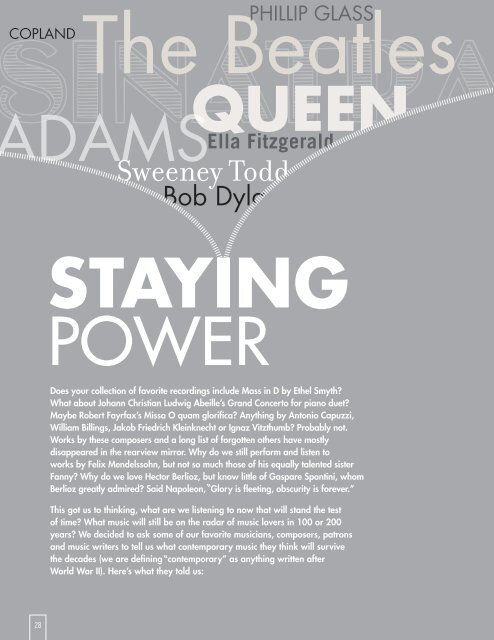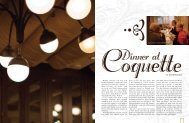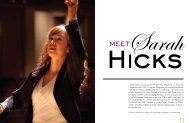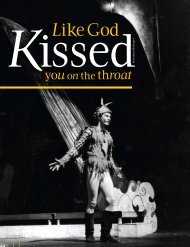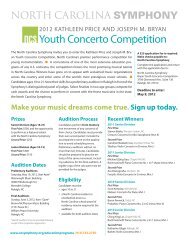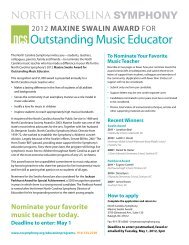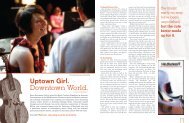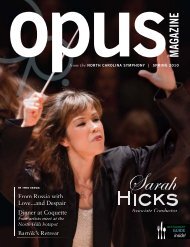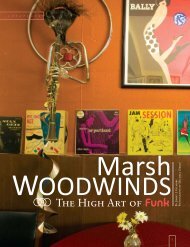Opus magazine - North Carolina Symphony
Opus magazine - North Carolina Symphony
Opus magazine - North Carolina Symphony
- No tags were found...
You also want an ePaper? Increase the reach of your titles
YUMPU automatically turns print PDFs into web optimized ePapers that Google loves.
Copland<br />
phillip glass<br />
The Beatles<br />
QUEEN<br />
damsElla Fitzgerald<br />
Sweeney Todd<br />
Bob Dylan<br />
Staying<br />
Power<br />
Does your collection of favorite recordings include Mass in D by Ethel Smyth<br />
What about Johann Christian Ludwig Abeille’s Grand Concerto for piano duet<br />
Maybe Robert Fayrfax’s Missa O quam glorifica Anything by Antonio Capuzzi,<br />
William Billings, Jakob Friedrich Kleinknecht or Ignaz Vitzthumb Probably not.<br />
Works by these composers and a long list of forgotten others have mostly<br />
disappeared in the rearview mirror. Why do we still perform and listen to<br />
works by Felix Mendelssohn, but not so much those of his equally talented sister<br />
Fanny Why do we love Hector Berlioz, but know little of Gaspare Spontini, whom<br />
Berlioz greatly admired Said Napoleon, Glory is fleeting, obscurity is forever.”<br />
This got us to thinking, what are we listening to now that will stand the test<br />
of time What music will still be on the radar of music lovers in 100 or 200<br />
years We decided to ask some of our favorite musicians, composers, patrons<br />
and music writers to tell us what contemporary music they think will survive<br />
the decades (we are defining contemporary” as anything written after<br />
World War II). Here’s what they told us:<br />
J. Mark Scearce, composer<br />
Well, since Good Music is Scearce – I mean<br />
scarce – I have to believe my own will move a<br />
soul or two a hundred years after I am gone,<br />
or what is it all for In fact, I have to believe<br />
that every time I approach The Blank White<br />
Page or else it doesn’t get filled!<br />
But other than my own music, 100 years<br />
from now, we will still listen to: Stravinsky<br />
and Shostakovich, Barber and Britten, Berg<br />
and Bernstein, Copland and Messiaen, but<br />
also John Corigliano, John Adams, George<br />
Crumb, Bright Sheng, James MacMillan,<br />
Steve Reich, Morten Lauridsen and Eric<br />
Whitacre. Our own Karel Husa’s Music for<br />
Prague 1968 will be played as emblematic<br />
of the turbulent 20th century as long as<br />
there are bands and orchestras to play it.<br />
But I started out as a jazz trumpeter,<br />
so I am sure we will also listen to: Miles,<br />
Monk, Dizzy, Bird, Clifford, Trane, Horace,<br />
Ornette, Mingus, Chick, Herbie, Zappa, Bill<br />
Evans, Gil Evans, Stan Getz and all those<br />
immortal singers – Ella, Frank, Sammy,<br />
Dino, Etta, Eartha, Johnny, Nina, Nneena,<br />
Ethel, Tony, Sarah, Joe, Dinah, Nat King<br />
Cole. It is impossible for me to consider<br />
a future where Joe Zawinul’s “A Remark<br />
You Made” from Weather Report’s classic<br />
Heavy Weather album of 1978 does not<br />
best express one hundred years of solitude<br />
two hundred years from now.<br />
Erik Dyke, <strong>North</strong> <strong>Carolina</strong> <strong>Symphony</strong><br />
double bass<br />
Phillip Glass is fascinating. His opera<br />
Christopher Columbus in the New World<br />
and his violin concerto are mesmerizing.<br />
Jennifer Higdon, composer<br />
Anything that the Beatles wrote and<br />
performed. It’s amazing to me that even<br />
though those songs were written more than<br />
forty years ago, they still sound relevant and<br />
engaging. I see teenagers today responding<br />
to their music, even when they don’t know<br />
who The Beatles are!<br />
I’m beginning to suspect that Blue<br />
Cathedral might be my one work that<br />
lasts in the symphonic repertoire for many,<br />
many years. A composer writes a piece,<br />
assuming that there will be a premiere but<br />
not knowing how that work will fare in<br />
the world beyond (usually, works don’t get<br />
done again beyond the premiere). But this<br />
little piece continues to build momentum,<br />
having now been done by more than 250<br />
orchestras since its 2000 debut. And the<br />
bookings continue to be strong!<br />
Dr. Robert Lacin, <strong>North</strong> <strong>Carolina</strong><br />
<strong>Symphony</strong> Board of Trustees<br />
Definitely The Beatles!<br />
Brian Reagin, <strong>North</strong> <strong>Carolina</strong> <strong>Symphony</strong><br />
concertmaster<br />
Tchaikovsky’s Violin Concerto, because<br />
it’s exciting and because I’m going to keep<br />
playing it until I get it perfect, which will<br />
probably take another hundred years!<br />
Roy C. Dicks, music writer<br />
John Adams continues to be a successful<br />
and respected composer, but his masterpiece<br />
is his 1987 Nixon in China, notable for its<br />
driving rhythms and rich textures, as well<br />
as for the poetic treatment of its historical<br />
subject matter.<br />
Stephen Sondheim is known principally as<br />
a musical theatre composer, but his works<br />
are being performed more and more in the<br />
opera house. Sweeney Todd has wonderfully<br />
complex vocal lines with wide-ranging<br />
emotions, which benefit from performances<br />
by classically trained musicians.<br />
Leonard Bernstein is revered as a major<br />
talent, but his 1971 MASS was quite<br />
controversial at its premiere. Now it only<br />
grows in stature. Its theatrical combination<br />
of sacred and profane is deeply moving and<br />
vividly entertaining.<br />
Joe Newberry, songwriter/musician<br />
This is just a small sample of the top of<br />
my head (and who knows, maybe one of<br />
my own songs will stand the test of time):<br />
“Blue Moon of Kentucky,” Bill Monroe;<br />
“This Land is Your Land,” Woody Guthrie<br />
(composed in 1940, but I mean, what is<br />
five years among friends); “Yesterday,”<br />
Paul McCartney; “Imagine,” John Lennon;<br />
“Orphan Girl,” Gillian Welch; “Crazy,”<br />
Willie Nelson; “Hot Buttered Rum,”<br />
Tommy Thompson of the Red Clay<br />
Ramblers; “Rambling Boy,” Tom Paxton;<br />
“The Times They Are a-Changing,” Bob<br />
Dylan; “Fields of Gold,” Sting; “Bridge<br />
Over Troubled Waters,” Paul Simon; “Take<br />
Five,” by the Dave Brubeck Quartet.<br />
Tift Merritt, singer/songwriter<br />
Bob Dylan: “Highway 61 Revisited,”<br />
“Times They Are a-Changing,” “Hard<br />
Rain’s Gonna Fall.”<br />
Neil Young: “Ohio.”<br />
“We Shall Overcome,” as adapted post-<br />
WWII during the Civil Rights movement.<br />
Popular music is tied inextricably to<br />
the time and atmosphere in which it was<br />
created and is particularly powerful as<br />
protest and political commentary. My<br />
hope is that these songs will continue<br />
to survive and strengthen over time as a<br />
picture of history, and that their lessons<br />
will not need relearning.<br />
Stephen Jaffe, composer<br />
What we know is that music, one of life’s<br />
great gifts, will be with us in one hundred<br />
years, and that it will continue to evolve.<br />
We don’t know the form. If we’re guided by<br />
the importance of music, and if we invest<br />
in its present, what we now value about<br />
musical expression will have a future. For<br />
it not to ossify, our musical culture requires<br />
musicians and audiences who advance<br />
music’s substance and import, with a spirit<br />
of adventure and significance, in a word,<br />
with love. Said otherwise: you have to<br />
invent the future if you want it to be there.<br />
We’re up to it.<br />
It’s our job as musicians – indeed it’s the<br />
job of a great institution like the <strong>North</strong><br />
<strong>Carolina</strong> <strong>Symphony</strong> – to make sure that the<br />
musical present includes the components of<br />
creativity (especially including the fostering<br />
of new composition), education (of players,<br />
and audiences, and patrons) and community,<br />
so that the next generation can shape future<br />
audiences through whatever technological<br />
and artistic tools they have at their disposal.<br />
Aspiring to make imaginative music – to<br />
make it interesting, special, attractive to<br />
28<br />
29


